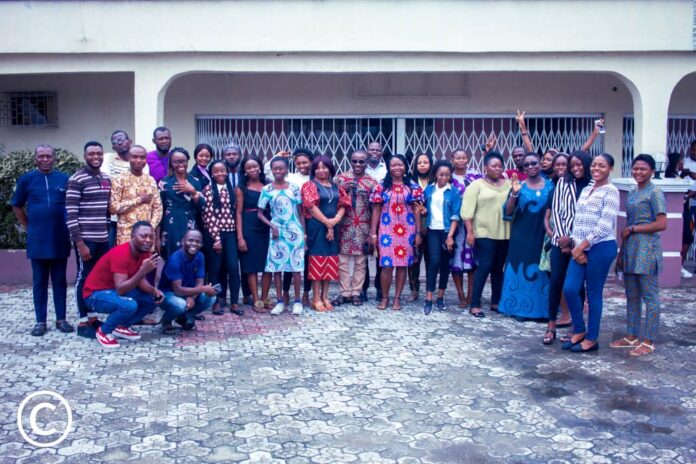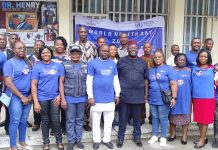By Kelvin Obambon
The International Youth Alliance for Family Planning (IYAFP) in partnership with the Initiative for People’s Good Health (IPGH), has organized a one-day training workshop for Civil Society Organizations in Cross River on effective ways of providing Youth Friendly Services (YFS).
The training which took place on Wednesday at Gomays Plaza in Calabar the state capital, was attended by participants drawn from about 30 CSOs operating in Cross River.
Declaring the workshop open, Miss Madonna Badom, Advocacy Associate at IYAFP, underscored the importance of Youth Friendly Services as encapsulated in the Sexual Reproductive Health and Rights (SRHR), which necessitated the training to drive home the messages and equip service providers with up-to-date knowledge and skills on how best to deliver these services to the target population; and to ultimately achieve the objectives of the Sustaining Evidence Driven Advocacy (SEDA).
She explained that “Youth Friendly Services are services use to bridge the gap for young people so that they can access Sexual Reproductive Health and Rights services in their health centers.”
Continuing, Badom cited a 2018-2019 research carried out by the Population Reference Bureau (PRB) and IYAFP, which discovers that “Many young people in Cross River State do not go to health facilities to access family planning and sexual reproductive health services due to many barriers, including socio-cultural, structural and individual barriers.
“Apart from Cross River State, we did this research in Abuja and Anambra. We noticed that there are some laws… That even before the child comes to the hospital to access these services, they must come with an adult; and we know that is already a barrier because the child will not talk about his or her sexual life in the presence of an adult. There are so many myths and misconceptions concerning SRHR that are spread to young people all over.
“So, Youth Friendly Services are there to bridge that gap so that these young persons would be free to access these services on their own without any barrier. The SEDA project has two major objectives here in Cross River. The first objective is to initiate the process of domestication of an SRHR policy in the state. The second objective is to secure a commitment from all SRHR organizations to include some forms of Youth Friendly Services in every programme they carry out in Cross River so as to bridge the gap observed in the research document.”
Speaking during the training, which was partly activity based, the resource person and facilitator, Mrs Grace Ibor, said communication is one of the major challenges in the provision of Sexual Reproductive Health services.
She highlighted effective communication, empathy, confidentiality, equity and respect, trust, synergy in service delivery, among others as key areas to consider when providing Youth Friendly Services.
Meanwhile, responding to question on whether the government, CSOs and other stakeholders have done enough in the provision of Youth Friendly Services in Cross River, Mrs Ibor, said: “I can’t say we have done enough because we have to move with the trend. Whatever we don’t have to give out, young people will get it from the internet and we don’t know how good or how true these sources of information can be. So on Youth Friendly Services we need to focus more on creating an environment within the system that provides young people the opportunity to be able to express themselves and also the things they face so we can make better provisions for answers to their questions and also to give them an opportunity to deal with the challenges they are facing.
“The first thing I’m actually looking at is how friendly are our services. What are the various approaches use by service providers to make young people want to come to your center to receive that service. The approach per se is not by what you say to them, but how much do we give them the opportunity to express themselves so that we can really get what it is we need to do.”
On the challenges service providers face in getting information from young people, the facilitator explained that “It’s really challenging because of a lot of things related to stigma and discrimination. There are two generational gaps. Before we do not have a lot of information compare to the information young people have now. Sometimes parents don’t understand that and we feel that it is only what we tell the children at home that they need to hear and listen to. But now it’s a whole different ball game. They get a lot of information online.
“So parents and service providers also have to brace and get themselves ready to get those same information, come down to sort out the truth from the lies so that they can now make a pathway for young people to follow the right information. And that is really challenging, unlike the young people, the older generation have other things to deal with. You have to deal with that and still catch up with the online information to be able to know where, what is trending and how you can bring them down to the services you provide to young people and to say no this thing that is trending is not actually the right way to follow.
“Also, access to resources makes it very challenging. There are many organizations providing sexual and reproductive health services that don’t have access to resources, especially because most programmes are donor dependent, and with the wave of COVID-19 in the globe, you see countries battling to deal with that, and not having support to give out as donations to external countries.”
Miss Rachel Egana, from BrenCare Foundation, who spoke on behalf of other participants, commended IYAFP for organizing the workshop, which according to her, has widened their knowledge on how to provide effective and efficient Youth Friendly Services to young people.
The following resolutions were made at the end of the training workshop:
Ability to effectively communicate SRHR information to young people.
All SRH organizations in Cross River State should integrate AYFS in their programmes.
SRHR service providers should inculcate empathy by creating enabling environment for young people.
SRHR service providers should utilize available adolescents’ tool kits to deliver YFS in service provision centers.
YFS on SRHR should be made available, accessible, affordable and flexible (24/7).
YFS on SRHR should cut across people living with disabilities and other vulnerable groups.
AYFS on SRHR should be delivered in a youth-friendly language.
Conduct training and retraining of SRHR service providers in Cross River State to enable them deliver effective and efficient YFS.
Advocate for government to take ownership of donor-driven SRHR YFS in the state to ensure sustainability.
To improve synergy and collaboration among stakeholders and seeing other SRHR service provider as accountability partners.
Setting up accountability group as a mechanism for effective Monitoring, Evaluation, Accountability and Learning (MEAL) of SRHR service provision.
Inclusion of young people as peer educators in the provision of SRHR YFS.










